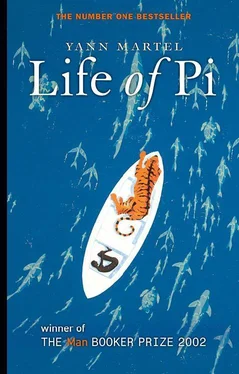Yann Martel - Life of Pi
Здесь есть возможность читать онлайн «Yann Martel - Life of Pi» весь текст электронной книги совершенно бесплатно (целиком полную версию без сокращений). В некоторых случаях можно слушать аудио, скачать через торрент в формате fb2 и присутствует краткое содержание. Год выпуска: 2002, ISBN: 2002, Издательство: Canongate Books, Жанр: Современная проза, на английском языке. Описание произведения, (предисловие) а так же отзывы посетителей доступны на портале библиотеки ЛибКат.
- Название:Life of Pi
- Автор:
- Издательство:Canongate Books
- Жанр:
- Год:2002
- ISBN:9781847674210
- Рейтинг книги:3 / 5. Голосов: 1
-
Избранное:Добавить в избранное
- Отзывы:
-
Ваша оценка:
- 60
- 1
- 2
- 3
- 4
- 5
Life of Pi: краткое содержание, описание и аннотация
Предлагаем к чтению аннотацию, описание, краткое содержание или предисловие (зависит от того, что написал сам автор книги «Life of Pi»). Если вы не нашли необходимую информацию о книге — напишите в комментариях, мы постараемся отыскать её.
Life of Pi — читать онлайн бесплатно полную книгу (весь текст) целиком
Ниже представлен текст книги, разбитый по страницам. Система сохранения места последней прочитанной страницы, позволяет с удобством читать онлайн бесплатно книгу «Life of Pi», без необходимости каждый раз заново искать на чём Вы остановились. Поставьте закладку, и сможете в любой момент перейти на страницу, на которой закончили чтение.
Интервал:
Закладка:
One day I was on a walk in the forest. I was walking vigorously, caught up in my own thoughts. I passed a tree—and practically ran into Richard Parker. Both of us were startled. He hissed and reared up on his hind legs, towering over me, his great paws ready to swat me down. I stood frozen to the spot, paralyzed with fear and shock. He dropped back on all fours and moved away. When he had gone three, four paces, he turned and reared up again, growling this time. I continued to stand like a statue. He went another few paces and repeated the threat a third time. Satisfied that I was not a menace, he ambled off. As soon as I had caught my breath and stopped trembling, I brought the whistle to my mouth and started running after him. He had already gone a good distance, but he was still within sight. My running was powerful. He turned, saw me, crouched—and then bolted. I blew into the whistle as hard as I could, wishing that its sound would travel as far and wide as the cry of a lonely tiger.
That night, as he was resting two feet beneath me, I came to the conclusion that I had to step into the circus ring again.
The major difficulty in training animals is that they operate either by instinct or by rote. The shortcut of intelligence to make new associations that are not instinctive is minimally available. Therefore, imprinting in an animal’s mind the artificial connection that if it does a certain action, say, roll over, it will get a treat can be achieved only by mind-numbing repetition. It is a slow process that depends as much on luck as on hard work, all the more so when the animal is an adult. I blew into the whistle till my lungs hurt. I pounded my chest till it was covered with bruises. I shouted “Hep! Hep! Hep!”—my tiger-language command to say “Do!”—thousands of times. I tossed hundreds of meerkat morsels at him that I would gladly have eaten myself. The training of tigers is no easy feat. They are considerably less flexible in their mental make-up than other animals that are commonly trained in circuses and zoos—sea lions and chimpanzees, for example. But I don’t want to take too much credit for what I managed to do with Richard Parker. My good fortune, the fortune that saved my life, was that he was not only a young adult but a pliable young adult, an omega animal. I was afraid that conditions on the island might play against me, that with such an abundance of food and water and so much space he might become relaxed and confident, less open to my influence. But he remained tense. I knew him well enough to sense it. At night in the lifeboat he was unsettled and noisy. I assigned this tension to the new environment of the island; any change, even positive, will make an animal tense. Whatever the cause, the strain he was under meant that he continued to show a readiness to oblige; more, that he felt a need to oblige.
I trained him to jump through a hoop I made with thin branches. It was a simple routine of four jumps. Each one earned him part of a meerkat. As he lumbered towards me, I first held the hoop at the end of my left arm, some three feet off the ground. When he had leapt through it, and as he finished his run, I took hold of the hoop with my right hand and, my back to him, commanded him to return and leap through it again. For the third jump I knelt on the ground and held the hoop over my head. It was a nerve-racking experience to see him come my way. I never lost the fear that he would not jump but attack me. Thankfully, he jumped every time. After which I got up and tossed the hoop so that it rolled like a wheel. Richard Parker was supposed to follow it and go through it one last time before it fell over. He was never very good at this last part of the act, either because I failed to throw the hoop properly or because he clumsily ran into it. But at least he followed it, which meant he got away from me. He was always filled with amazement when the hoop fell over. He would look at it intently, as if it were some great fellow animal he had been running with that had collapsed unexpectedly. He would stay next to it, sniffing it. I would throw him his last treat and move away.
Eventually I quit the boat. It seemed absurd to spend my nights in such cramped quarters with an animal who was becoming roomy in his needs, when I could have an entire island. I decided the safe thing to do would be to sleep in a tree. Richard Parker’s nocturnal practice of sleeping in the lifeboat was never a law in my mind. It would not be a good idea for me to be outside my territory, sleeping and defenceless on the ground, the one time he decided to go for a midnight stroll.
So one day I left the boat with the net, a rope and some blankets. I sought out a handsome tree on the edge of the forest and threw the rope over the lowest branch. My fitness was such that I had no problem pulling myself up by my arms and climbing the tree. I found two solid branches that were level and close together, and I tied the net to them. I returned at the end of the day.
I had just finished folding the blankets to make my mattress when I detected a commotion among the meerkats. I looked. I pushed aside branches to see better. I looked in every direction and as far as the horizon. It was unmistakable. The meerkats were abandoning the ponds—indeed, the whole plain—and rapidly making for the forest. An entire nation of meerkats was on the move, their backs arched and their feet a blur. I was wondering what further surprise these animals held in store for me when I noticed with consternation that the ones from the pond closest to me had surrounded my tree and were climbing up the trunk. The trunk was disappearing under a wave of determined meerkats. I thought they were coming to attack me, that here was the reason why Richard Parker slept in the lifeboat: during the day the meerkats were docile and harmless, but at night, under their collective weight, they crushed their enemies ruthlessly. I was both afraid and indignant. To survive for so long in a lifeboat with a 450-pound Bengal tiger only to die up a tree at the hands of two-pound meerkats struck me as a tragedy too unfair and too ridiculous to bear.
They meant me no harm. They climbed up to me, over me, about me—and past me. They settled upon every branch in the tree. It became laden with them. They even took over my bed. And the same as far as the eye could see. They were climbing every tree in sight. The entire forest was turning brown, an autumn that came in a few minutes. Collectively, as they scampered by in droves to claim empty trees deeper into the forest, they made more noise than a stampeding herd of elephants.
The plain, meanwhile, was becoming bare and depopulated.
From a bunk bed with a tiger to an overcrowded dormitory with meerkats—will I be believed when I say that life can take the most surprising turns? I jostled with meerkats so that I could have a place in my own bed. They snuggled up to me. Not a square inch of space was left free.
They settled down and stopped squeaking and chirping. Silence came to the tree. We fell asleep.
I woke up at dawn covered from head to toe in a living fur blanket. Some meerkittens had discovered the warmer parts of my body. I had a tight, sweaty collar of them around my neck—and it must have been their mother who had settled herself so contentedly on the side of my head—while others had wedged themselves in my groin area.
They left the tree as briskly and as unceremoniously as they had invaded it. It was the same with every tree around. The plain grew thick with meerkats, and the noises of their day started filling the air. The tree looked empty. And I felt empty, a little. I had liked the experience of sleeping with the meerkats.
I began to sleep in the tree every night. I emptied the lifeboat of useful items and made myself a nice treetop bedroom. I got used to the unintentional scratches I received from meerkats climbing over me. My only complaint would be that animals higher up occasionally relieved themselves on me.
Читать дальшеИнтервал:
Закладка:
Похожие книги на «Life of Pi»
Представляем Вашему вниманию похожие книги на «Life of Pi» списком для выбора. Мы отобрали схожую по названию и смыслу литературу в надежде предоставить читателям больше вариантов отыскать новые, интересные, ещё непрочитанные произведения.
Обсуждение, отзывы о книге «Life of Pi» и просто собственные мнения читателей. Оставьте ваши комментарии, напишите, что Вы думаете о произведении, его смысле или главных героях. Укажите что конкретно понравилось, а что нет, и почему Вы так считаете.












